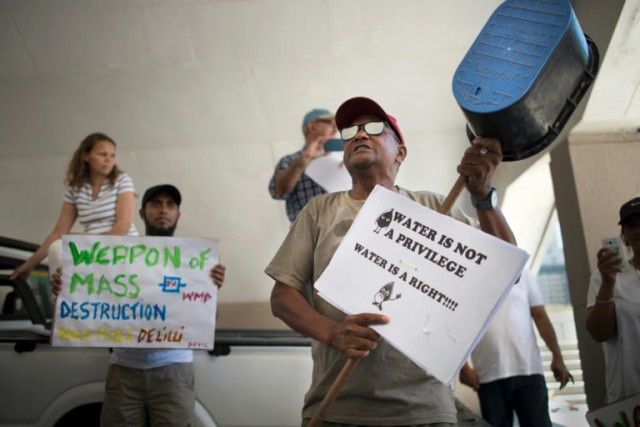Vulnerable fear Cape Town's water shut-off
Residents are watched over by a unit of private security guards, deployed in response to recent tensions

Most Cape Town residents will be forced to queue at communal taps at 200 water points to collect a daily ration of 25 litres. PHOTO: AFP
The youngsters who depend on the Catholic charity's care are fed according to strict instructions on a whiteboard that shows each child's name and how much water they need.
"We make so many bottles a day -- this is such a big place. And before you go to each child, you need to wash your hands," care assistant Carmilla Slamdien told AFP as she described the water-intensive routine of feeding, washing and sterilisation.
'Cape Town could run out of water in just 10 weeks'
Nazareth House's residents are among the city's most vulnerable people. They now face the prospect that their taps will be shut off within months as the three-year-long drought -- the worst in more than a century -- leaves reservoirs empty.
"Is there a plan? No. I can't think of how we'll do it after 'Day Zero'," said Slamdien, referring to the day when ordinary water supplies to more than a million homes will be shut off, currently forecast for May 11.
For Zone Janse Van Rensburg, an occupational therapist at the home who is eight months pregnant, "Day Zero" could bring real hardship.
Most Cape Town residents will be forced to queue at communal taps at 200 water points -- likely under police or military guard -- to collect a daily ration of 25 litres (6.6 US gallons) or half the amount allowed now.
"I will have a tiny newborn with no water which will be a massive challenge," said Rensburg, 31.
"I don't know what we'll do. The whole crisis is just overwhelming. When you're pregnant, they say 'don't lift anything' -- but then you're lifting a bucket to flush the toilet."
City councillor JP Smith, an official leading Cape Town's drought relief efforts, told AFP that facilities like Nazareth House will instead be supplied by tankers or volunteers carrying bottles -- but many locals have little confidence in authorities.
For many residents in Cape Town's impoverished townships, the state's failure to provide domestic tap water is an established fact of life.
Vuyo Twani was among a steady stream of residents in Langa township this week sharing a tap to fill plastic containers, as well as to wash chicken feet and rinse mops.
"You don't know if there'll be water," said Twani of the three taps that supply several hundred residents.
"If you can't find any water I have to go the Shoprite" supermarket, he added. "That's expensive."
S&P slashes S Africa rating into ‘junk’
City officials estimate that informal settlement's like Twani's use just five per cent of the city's water. Twani -- who works as a bartender at the five-star Belmond Mount Nelson Hotel in the city centre -- said that he, along with his wife and young daughter, use just 10 litres per day at home.
He doubted that residents of Cape Town's wealthier areas -- which account for more than 65 per cent of total consumption -- would cope with water queues and ever stricter limits.
"These people in the suburbs, they're just used to waking up and showering and brushing their teeth," he said, wearing a singlet over his slim frame.
But Twani said guests at his hotel bar are well aware of Cape Town's water crisis. "Even if we wash the drinks shakers, they'll say 'save water!'," Twani said as he caught the last few drops from the tap.
At the Theewaterskloof dam, an hour-and-a-half from central Cape Town, a once verdant reservoir has given way to a craggy, sun-baked plain of mud pocked with scrub and long cracks.
The reservoir sits exposed to the baking sun and is now only 12.5 per cent full. Experts warn that anything below 10 per cent is unlikely to be usable.
Back in the city, thousands of Capetonians queue every day to collect fresh water from the Newlands spring, next to a brewery, to supplement their individual 50-litre quotas.
Residents are watched over by a unit of private security guards, deployed in response to recent tensions at the natural spring.
A rigidly-enforced system of limits and a recently implemented express queue have imposed order after a scuffle. Women wearing expensive floral-print pencil dresses waited alongside young men in labourers' overalls and families with children wearing uniforms from both private and government schools.
"It's not just about the water, it's about the social impact of not having access to a resource," said researcher Fairuz Mullagee, 56, as she filled up at the spring.
"It's going to amplify inequalities... We already experience it here -- the tensions and the conflict."



















COMMENTS
Comments are moderated and generally will be posted if they are on-topic and not abusive.
For more information, please see our Comments FAQ